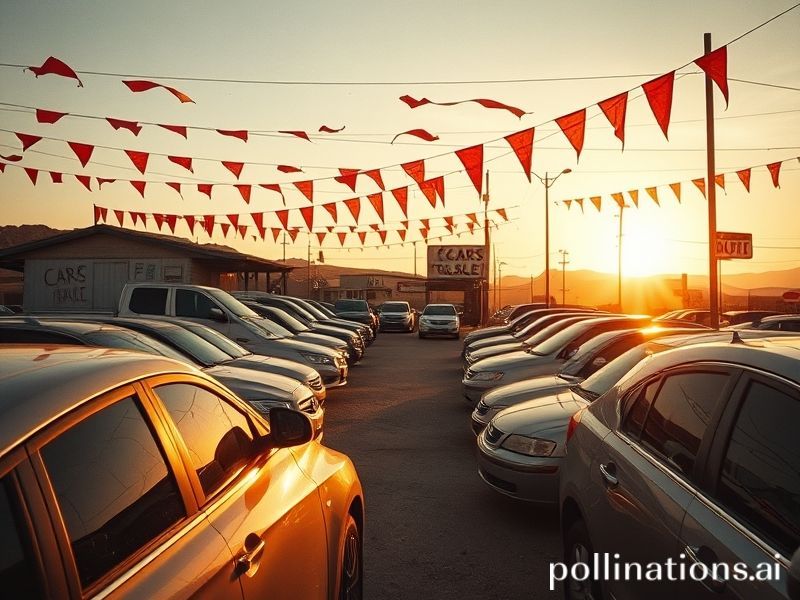Global Garage Sale: How Every ‘Car for Sale’ Reveals the Planet’s Guilty Secrets
Bargain Bin Planet: The Global Garage Sale of “Cars for Sale”
By the Bureau Chief for Dimly Lit Parking Lots, Dave’s Locker
There is a moment—usually around 3 a.m. local time, when the neon of the used-car lot flickers like a migraine—when you realize that “cars for sale” is no longer a classified ad but a planetary confession booth. From Lagos to Leipzig, from Guadalajara to Guangzhou, humanity is off-loading its wheeled sins while pretending it’s merely upgrading. We are not trading vehicles; we are laundering regret with alloy rims.
Start in Dubai, where supercars are abandoned faster than New Year’s resolutions. Ferraris with sand-dusted windshields sit in airport short-stay lots like high-maintenance camels, keys still in the ignition and owners presumably on a one-way flight to avoid Sharia-compliant debt collectors. The municipality auctions them every quarter, attracting oligarchs from Moscow who need a weekend toy and influencers who need a backdrop. The circle of life, but with more carbon fiber.
Slide over to Sub-Saharan Africa, where Japanese saloons—retired after 80,000 polite kilometers in Osaka—are reborn as bush taxis that will endure 800,000 kilometers of potholes, goats, and sudden border closures. The radio still speaks Japanese; the dashboard shrine now hosts a plastic Virgin Mary. A corrugated-roof entrepreneur in Kumasi will finance your purchase via WhatsApp; the APR is whatever the chief thinks you can pay before harvest. The IMF calls this “second-hand capital flows.” Everyone else calls it Tuesday.
In Central Europe, meanwhile, the Dieselgate generation is being quietly resold to buyers who still believe in fairy tales—like the one where a software update turns a toxic liar into an eco-angel. Warsaw commuters queue at shady pop-up dealerships operating out of decommissioned Soviet cinemas, hoping the check-engine light is just a suggestion. The European Commission tsk-tsks from Brussels, then mails another sternly worded PDF nobody prints because paper is taxed.
Head west to the United States, where the average used car now costs more than a year at an in-state university—proof that knowledge may be power, but mobility still gets you to the job. Subprime lenders—those benevolent cousins of payday loan sharks—offer 96-month terms that will outlast the driver’s next three relationships. The cars themselves are “pre-owned,” a euphemism that sounds gentler than “pre-crashed.” Americans, ever optimistic, call it “freedom.” Repo men, ever present, call it “Tuesday night overtime.”
And then there is China, where “cars for sale” happens on an app, livestreamed by a 23-year-old influencer wearing cat-ear headphones and a Gucci mask. A BYD hatchback sells every 15 seconds while viewers spam digital fireworks. State regulators applaud the electrification of the fleet; coal plants two provinces away cough politely. The algorithm decides your trade-in value based on your social-credit score and how often you jaywalk. Black Mirror was supposed to be fiction, not a franchise.
The global calculus is ruthless. Every vehicle exported from the Global North to the Global South is one step closer to a landfill, but also one step closer to a midwife reaching a rural clinic before the umbilical cord is cut. The moral mileage varies. A 2009 Toyota Corolla in Helsinki is scrap; in La Paz it is a miracle with cupholders.
We buy, we sell, we pretend the odometer is the only thing that’s been rolled back. Meanwhile, glaciers retreat at the speed of a used-car salesman’s conscience, and the oceans rise like final balloon payments. Yet the lot remains lit, the speakers still hiss a tinny pop song about eternal summer, and somewhere a teenager signs a contract he cannot read because it is written in compound interest.
The international trade in “cars for sale” is, at bottom, a planetary swap meet of deferred consequences. We trade metal, rubber, and dreams—then wonder why the air tastes like regret. Still, the line forms to the left; bring your passport, your down payment, and a forgiving sense of irony. After all, the next owner will need something to haul away our mistakes.







